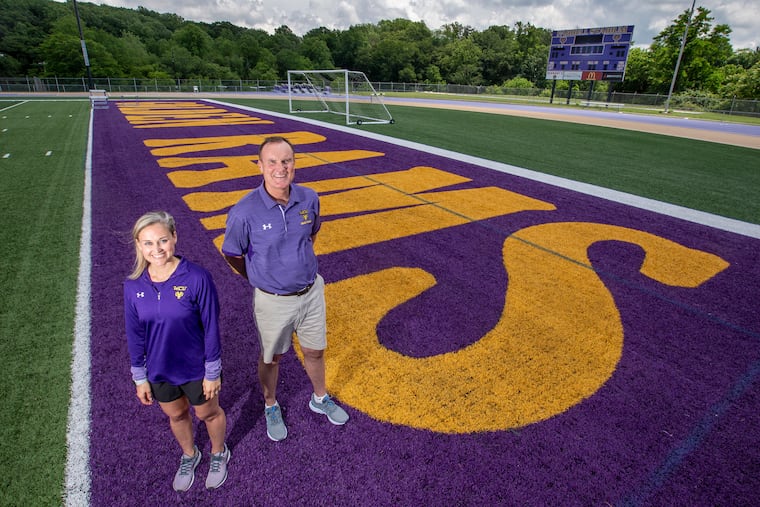The pressure was on for West Chester athletic trainers in charge of pandemic protocols | Mike Jensen
There was no textbook chapter on how 2020-21 went down. (Although surely it will be in the next edition.)

You get a phone call, “Check your email.”
If you’re a college athletic trainer working during the COVID-19 pandemic, in charge of the protocols that keep your athletes playing, such a message from an assistant athletic director also in charge of pandemic efforts causes your heart to skip a beat.
You check your email … make it two beats.
Athletic trainers across the college landscape are used to a certain level of job pressure. A football team shows up for full-contact preseason practices in the heat of August, that’s an annual pressure point.
» READ MORE: When PSAC fall sports shut down, there were struggles
“We are constantly risk mitigators,” said Katie Morrison, an athletic trainer for West Chester University, and also a full professor of sports medicine, helping train the next generation of athletic trainers since West Chester claims the largest such academic department in the country.
Maybe all of that prepared Morrison and her coworkers for the last year, or none of it did. There was no textbook chapter on how 2020-21 went down. (Although surely it will be in the next edition.)
When West Chester first said no sports for the academic year because of the pandemic, then reversed course … spring sports were on … you don’t have to guess at the pressures facing the people in charge of the protocols.
“I felt such pressure to do the right things,” Morrison said. “There was so much unknown.”
A West Chester coach put it to me like this: If coaches have losing seasons, they probably have to answer for it. Things go really bad, their job is on the line. Here, the pressure on the athletic trainers was similar, the stakes just so much higher.
“We wouldn’t be unique,” Morrison said. “Every single trainer in our conference and across the nation felt it.”
All the time.
“I lost a lot of sleep,” Morrison said.
She’s talking about it now because it worked out all right. No catastrophes. Across spring sports, there were six positive COVID-19 tests that kept West Chester athletes off the field. No hospitalizations for athletes or staff. There was that email, though. That day, the softball team was leaving for the Pennsylvania State Athletic Conference championship round, to stay the night, begin play the next day.
“We hadn’t had a positive test since February,” Morrison said.
Suddenly, there were six positives on the rapid antigen tests.
“I had to call every one of these women, ‘What are your symptoms?’ None had symptoms,” Morrison said. “I asked for close contacts, contacted them.”
West Chester’s athletic director made calls, got a three-hour extension on the game time. The bus ride that day and the hotel that night were called off. Including the close contacts, Morrison figured 16 girls were still clear. She called the coach, Diane Lokey.
“You have to say, ‘You have these 16 girls, can you play?’ ”
“ ‘Yes, we’ll shift players around.’ ”
Players had all come in and gotten swabbed for a PCR test. They had to wait for the results.
“Fax after fax came in, in batches,” Morrison said. “Negative, negative, negative …”
Most of the faxes came in on time for those players to get on the bus for Seton Hill College outside Pittsburgh. The school rented a van for the last players. They all got to the game.
“For them to go win that game the way they did,” Morrison said. “I felt, like, chills.”
The next day, they won again, winning the PSAC title, qualifying for the NCAA Division II national tournament. On to the NCAA East Regional. Win, win, win, win. On to the national championship tournament.
The Rams lost twice in Denver, but the 2021 season was such a winner, 34-16 overall, and the fact the season happened at all came back to the COVID-19 protocols. Morrison gave enormous credit to the whole athletic department, and most of all to the due diligence of the athletes following the protocols.
“Katie Morrison, she was really the architect behind this,” said John Smith, another West Chester athletic trainer. “She touched every single component of this return. Katie believed in her heart and soul that bringing back the student-athletes as soon as it was safe was going to be the best thing physically, mentally, and emotionally for their health. She never wavered in that.”
» READ MORE: Unvaccinated athletes should be fined | Marcus Hayes
“Everything kept changing,” Morrison said. “NCAA guidelines. State guidelines. County guidelines. It was insane, even at the 11th hour we had to keep modifying [protocols]. Writing it and carrying it out were two different things.”
Seasons over now means no more phone calls for the moment saying check your emails. The pressure eases a bit, although the August heat is right around the corner.